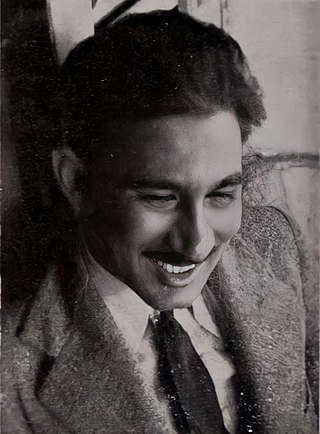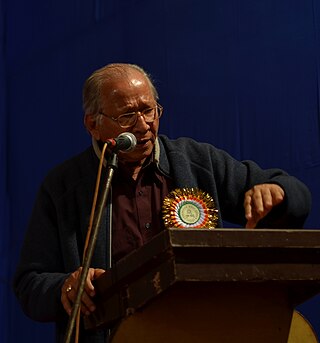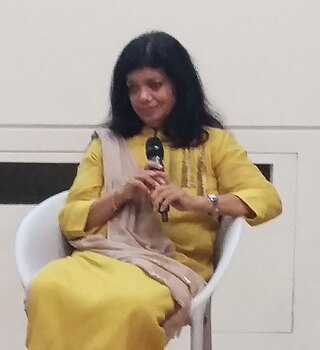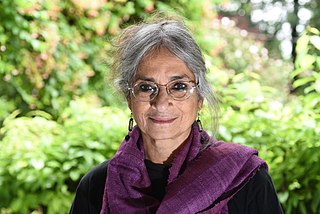
Khwaja Ahmad Abbas was an Indian film director, screenwriter, novelist, and journalist in Urdu, Hindi and English.

Ismat Chughtai was an Indian Urdu novelist, short story writer, liberal humanist and filmmaker. Beginning in the 1930s, she wrote extensively on themes including female sexuality and femininity, middle-class gentility, and class conflict, often from a Marxist perspective. With a style characterised by literary realism, Chughtai established herself as a significant voice in the Urdu literature of the twentieth century, and in 1976 was awarded the Padma Shri by the Government of India.

Sachchidananda Hirananda Vatsyayan, popularly known by his pen name Agyeya, was an Indian writer, poet, novelist, literary critic, journalist, translator and revolutionary in Hindi language. He pioneered modern trends in Hindi poetry, as well as in fiction, criticism and journalism. He is regarded as the pioneer of the Prayogavaad (experimentalism) movement in modern Hindi literature.

The Jnanpith Award is the oldest and the highest Indian literary award presented annually by the Bharatiya Jnanpith to an author for their "outstanding contribution towards literature". Instituted in 1961, the award is bestowed only on Indian writers writing in Indian languages included in the Eighth Schedule to the Constitution of India and English, with no posthumous conferral.
Choudhri Mohammed Naim is an American scholar of Urdu language and literature. He is currently professor emeritus at the University of Chicago.
Indian English poetry is the oldest form of Indian English literature. Henry Louis Vivian Derozio is considered the first poet in the lineage of Indian English poetry followed by Rabindranath Tagore, Sri Aurobindo, Sarojini Naidu, Michael Madhusudan Dutt, and Toru Dutt, among others.

Krishna Sobti was an Indian Hindi-language fiction writer and essayist. She won the Sahitya Akademi Award in 1980 for her novel Zindaginama and in 1996, was awarded the Sahitya Akademi Fellowship, the highest award of the Akademi. In 2017, she received the Jnanpith Award for her contribution to Indian literature.

Syed Asghar Wajahat, popularly known as Asghar Wajahat, is a Hindi scholar, fiction writer, novelist, playwright, an independent documentary filmmaker and a television scriptwriter, who is most known for his work, 'Saat Aasmaan' and his acclaimed play, 'Jis Lahore Nai Dekhya, O Jamyai Nai', based on the story of an old Punjabi Hindu woman who gets left behind in Lahore, after the Partition of India, and then refuses to leave.
Kunwar Narayan was a poet in Indian literature in Hindi. He read and traveled widely and wrote for six decades. He was linked to the New Poetry movement.
Shiv K. Kumar was an Indian English-language poet, playwright, novelist, and short story writer. His grandfather late Tulsi Das Kumar was a school teacher and his father Bishan Das Kumar, was a retired headmaster. The letter 'K' stands for Krishna, i.e. Shiv Krishna Kumar.

Uday Prakash is a Hindi poet, scholar, journalist, translator and short story writer from India. He has worked as administrator, editor, researcher, and TV director. He writes for major dailies and periodicals as a freelancer. He has also received several awards for his collection of short stories and poems. With Mohan Das he received Sahitya Academi Awards in 2011. He is the first author to return his Sahitya Akademi award on September 3, 2015 against the killing of M. M. Kalburgi that initiated a storm of national protests by writers, artists,scholars and intellectuals.
Krishna Kumar is an Indian intellectual and academician, noted for his writings on the sociology and history of education. His academic oeuvre has drawn on multiple sources, including the school curriculum as a means of social inquiry. His work is also notable for its critical engagement with modernity in a colonized society. His writings explore the patterns of conflict and interaction between forces of the vernacular and the state. As a teacher and bilingual writer, he has developed an aesthetic of pedagogy and knowledge that aspires to mitigate aggression and violence. In addition to his academic work, he writes essays and short stories in Hindi, and has also written for children. He has taught at the Central Institute of Education, University of Delhi, from 1981 to 2016. He was also the Dean and Head of the institution. From 2004 to 2010, he was Director of the National Council of Educational Research and Training (NCERT), an apex organization for curricular reforms in India. He was awarded the Padma Shri by the President of India in 2011.

Abhay Kumar [Pen Name Abhay K.] is an Indian poet-diplomat, editor, translator and anthologist. and currently serves as the deputy director general of Indian Council for Cultural Relations (ICCR), New Delhi. He joined the Indian Foreign Service in 2003 after doing master's in geography at Jawaharlal Nehru University and Kirorimal College, Delhi University. He served as India's 21st ambassador to Madagascar and Comoros from 2019-2022 and as India's Deputy Ambassador to Brazil from 2016-2019. He earlier served as Spokesperson and First Secretary at the Indian Embassy in Kathmandu, Nepal from 2012-2016 and as Acting Consul General of India in St. Petersburg, and Third/Second Secretary at Indian Embassy, Moscow,Russia from 2005 to 2010. He served as Under Secretary for Public Diplomacy at the Ministry of External Affairs from 2010-2012 and sent out the first tweet on its behalf in 2010 starting a new era of India's Digital Diplomacy.

Vinay Lal is an Indian historian. He is a professor of history and Asian American studies at UCLA. He writes widely on the history and culture of colonial and modern India, popular and public culture in India, cinema, historiography, the politics of world history, the Indian diaspora, global politics, contemporary American politics, the life and thought of Mohandas Gandhi, Hinduism, and the politics of knowledge systems.
Susan Visvanathan is an Indian sociologist, social anthropologist and a fiction writer. She is well known for her writings on religious dialogue and sociology of religion. Her first book Christians of Kerala: History, Belief and Ritual among the Yakoba is a pathbreaking work in the field of sociology of religion.

Santanu Kumar Acharya is a National Sahitya Academy Award-winning Indian writer.

Alka Saraogi is an Indian novelist and short story writer in the Hindi language. She is a recipient of the 2001 Sahitya Akademi Award for Hindi for her novel Kalikatha: Via Bypass.

Tridip Suhrud is an Indian writer, political scientist, cultural historian and translator from Gujarat, India.

Sara Rai, is a contemporary Indian writer, translator and editor of modern Hindi and Urdu fiction. She lives in Prayagraj, Uttar Pradesh, India. Rai mainly writes and publishes short stories in Hindi. Written in a reflective prose style, her stories explore the individual complexities in the lives of ordinary people and outsiders in contemporary India.
Asad Zaidi is an Indian poet, editor, translator, publisher, and literary critic. He has been a noted Hindi poet since the early 1980s.













